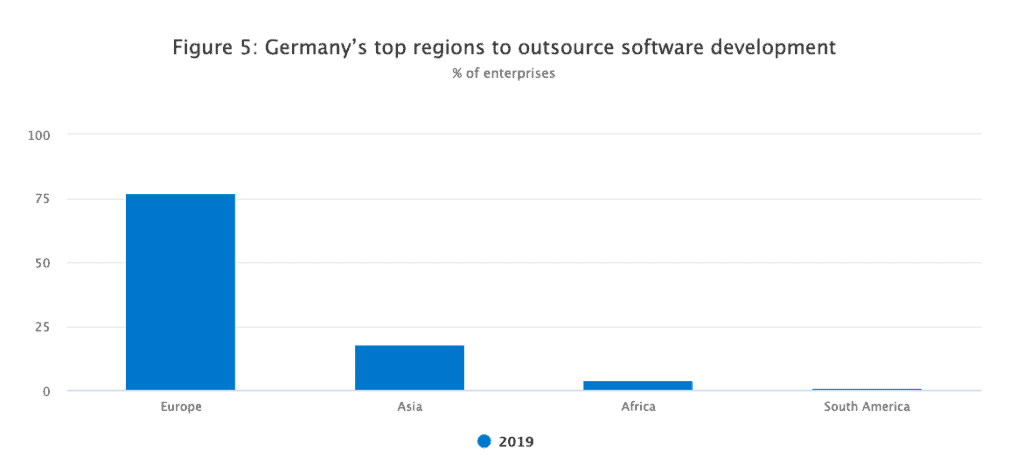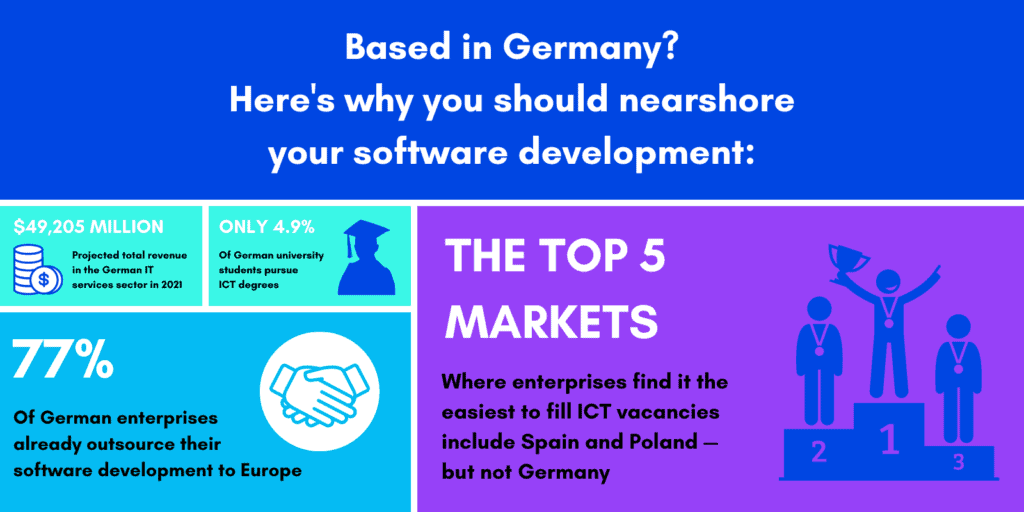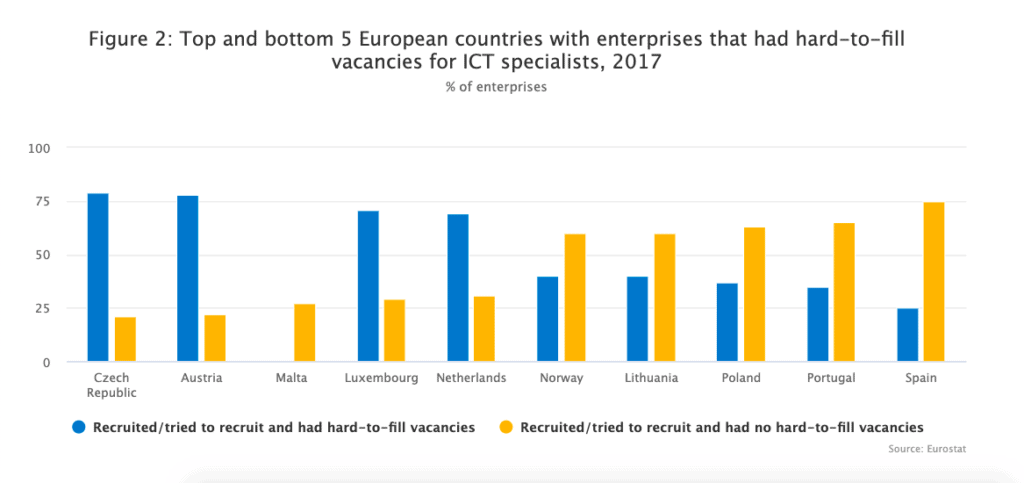The industry trends and our own client record are unequivocal: more and more German companies are looking into nearshore outsourcing. What’s the explanation for the sudden popularity of IT outsourcing in Germany?
The answer has mostly to do with the challenges German employers face when hiring developers in-house. From the long notice periods to Germany’s restrictive employment rules, the costs of recruiting locally can be prohibitive.
When we throw the ever-growing demand for tech talent and resulting skill shortage in the national market into the mix, it’s no wonder companies in Germany have been exploring various outsourcing arrangements. Chief among these has been nearshoring or extended software development.
What Is Extended Development?
Extended software development is a type of IT outsourcing in which a group of engineers based in a nearby country works together with the client’s in-house staff. This outsourcing model is also known as nearshoring or staff augmentation in the U.S.
In contrast to classic outsourcing or offshoring, where the remote team is located in a far-off country such as India and usually works on independent projects with minimal supervision, nearshore developers act as a seamless extension of the core team.
Which Is the Best Example of Outsourcing?
Both offshoring and nearshoring have their pros and cons. Which outsourcing strategy would work best for your company depends on many factors, including your industry, resources, project type (i.e., short- or long-term), and business goals.
That said, outsourcing in Europe is the preferred option for the vast majority of companies in Germany. In 2019, 77% of German enterprises nearshored their software development in Europe. Only 18% outsourced to Asia, and a mere and 4% and 1% had chosen Africa and South America, respectively.

Top 5 Benefits of IT Outsourcing in Europe for German Companies
Our clients in Germany report that the advantages of outsourcing to Southern, Central, and Eastern Europe far outweigh those of hiring developers in-house. Here’s why.

#1. Larger Talent Pool
The IT services sector is one of Germany’s most competitive industries. The total market revenue is expected to hit $49,205 million in 2021, and current estimates predict a 3% compound annual growth rate in 2019–2023.
With ICT graduates making up just 4.9% of students in tertiary education, the national job market hasn’t kept up with the rapid growth in demand for specialists — Germany’s traditionally high immigration rates notwithstanding.
As a result, employer competition is fierce, especially when it comes to attracting senior-level talent, and many companies in Germany end up seeking to relocate developers from abroad. Unfortunately, hiring foreign experts in-house is often more time- and labor-intensive than recruiting locally.
Nearshoring has the best of both worlds. It opens up new and larger international talent pools — but without the hassle and red tape of physically relocating people.
#2. Shorter Time to Kick-Off
Even if you manage to source talent locally, taking your project off the ground might take a while. Notice periods of three months are standard in Germany. While the specific notice periods in outsourcing destinations like Spain and Poland are governed by collective agreements and employment contracts, the minimum statutory notice in these countries is 15 days and one month, respectively.
The logistics and paperwork involved in relocating employees from abroad are even more time consuming, especially in a post-COVID world. Developers from Asia, Africa, Latin America, and certain Eastern European countries such as Ukraine, Russia, and Belarus need visas or work permits to work in Germany. International outsourcing is a much easier option for most employers.
#3. Superior Team Integration
Another benefit of nearshore outsourcing for German companies is that, unlike offshoring, it achieves a near-perfect integration of the remote and core staff.
The two teams typically work side by side on joint projects with the same deadlines and goals. Not only does that encourage tight cooperation and direct communication, but it also allows clients to stay on top of the work of the extended developers at every stage of the product development.
#4. Ease of Collaboration
For our clients in Germany, outsourcing to a location in Central or Southern Europe is the best way to ensure their remote developers would make an excellent cultural fit. You can expect a work ethic indistinguishable from that of your in-house employees. Language barriers shouldn’t be an issue, either, as most developers hailing from these regions are fluent in English. Many of them would have extensive experience working within distributed teams in English.
All that, coupled with the minimal time zone difference and ease of travel, allows for a smooth and effective collaboration.
#5. Better Scalability
IT outsourcing in Germany offers a level of flexibility that’s hard to beat. You are free to quickly and easily size your business up and down when and as needed. This level of flexibility is inherent to an outsourcing-based development strategy, but inherently contradictory to hiring permanent employees in-house.
Outsourcing to Spain and Poland with Zartis
Our specialty at Zartis — among other things — is assembling high-quality remote teams for businesses in Germany from our extended development centers in Spain and Poland.
Why Spain and Poland, though? It wasn’t a difficult choice to make.
In 2017, Eurostat ranked both countries among the top five markets in which enterprises found it the easiest to fill ICT vacancies — no skill shortage there!

And no wonder — Spain and Poland are Europe’s hot spots for up-and-coming tech companies, innovation, and young developer talent. For more details on the local outsourcing industry, check out our related articles:
- 5 Reasons to Outsource Your Software Development to Poland
- 5 Advantages of Setting Up an Extended Development Team in Spain
Want to Look into IT Outsourcing in Germany?
Contact Zartis today to explore our outsourcing services, talk to us about your priorities and requirements, and find the ideal remote team for your company.


